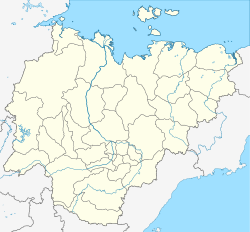Northeast Science Station
Northeast Science Station Северо-Восточная научная станция РАН | |
|---|---|
 | |
| Coordinates: 68°44′24″N 161°24′00″E / 68.73987°N 161.3999°E | |
| Country | Russia |
| Territory | Sakha Republic |
| Region | Siberia |
| Founded | 1977[1] |
| Director | Nikita Zimov |
| Time zone | UTC+11 (Magadan Time) |
The Northeast Science Station of the RAS (Russian: Северо-Восточная научная станция РАН) is an Arctic research station located in Chersky, Sakha Republic in Northeast Siberia. It is one of the world's three largest Arctic stations.[2]
Description
The Northeast Science Station is used as a year-round base for international research in arctic biology, geophysics, and atmospheric physics. The station also houses the administration of the Pleistocene Park, a local experimental wildlife preserve of 160 km2.
Named after Russian explorer Jan Czerski, Chersky is sited on frozen Pleistocene carbon. The sediments here are made up of 50% ice, and 50% loess, which is a windblown sediment - the carbon content of loess deposits is five times that of a rainforest floor. During each annual melt between 2 and 5% of the stored carbon in the loess deposits is lost.[3]
Far Eastern Federal University is planning to open an Arctic campus at the research station. “At the station, students and young scientists will study permafrost melting; greenhouse gas emissions; hydrates conservation; biodiversity; land, atmosphere and surrounding seas pollution; and other climatic, biological and environmental issues,” according to a press release.[2]
Personnel and funding
Resident staff consists of Nikita Zimov (director), Sergey Davydov, Galina Zimova, Sergey Zimov, Anastasija Zimova (bookkeeper).[4] Additionally, around sixty international researchers visit the institute annually.[4]
Salary of the resident staff is paid by the parent organisation, the Russian Academy of Sciences. The station itself is funded by the Max Planck Society.[4]
See also
References
- ^ "Pleistocene Park and the North-East Scientific Station," homepage of the Pleistocene Park website, without date. Retrieved 13 October 2017.
- ^ a b “Far Eastern Federal University may open Arctic campus at major polar station.” Arctic.Ru, 5 October 2017. Retrieved 13 October 2017
- ^ Terrestrial Carbon Observation System Siberia
- ^ a b c Anna-Lena Laurén: “Sibirien sjunker sakta ned i dyn när permafrosten tinar.” Dagens Nyheter, 31 July 2017. (Russian version, 24 September 2017.) Retrieved 18 October 2017

